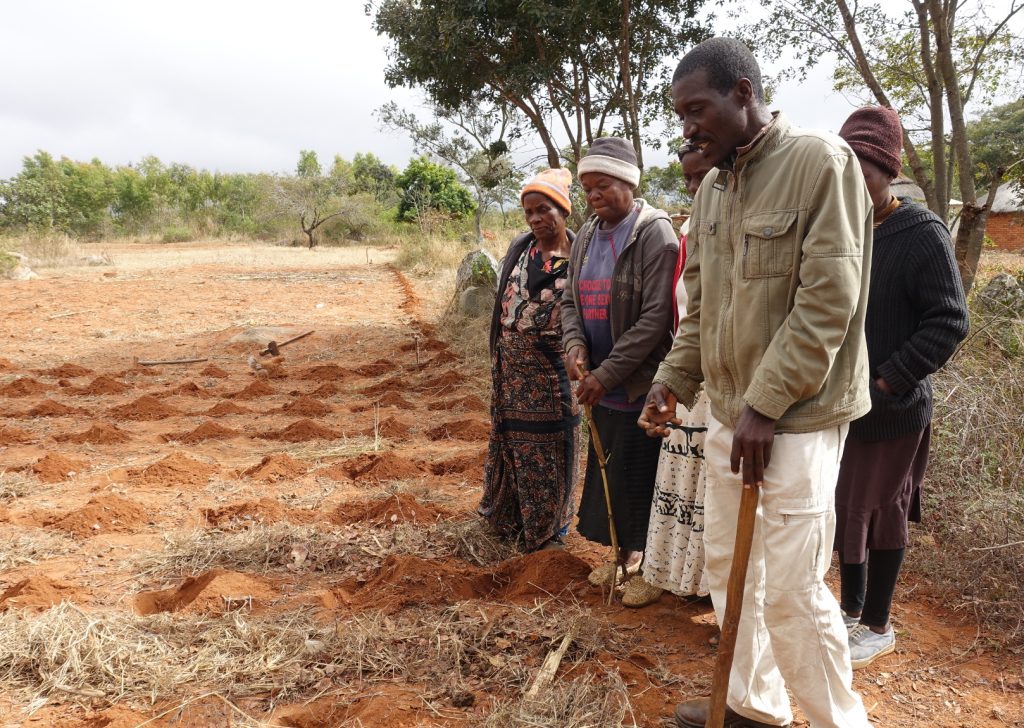A PADR facilitator (first right) is explaining a ploughing method
Stanley Enock Hanya is the Coordinator of Church and Community Mobilisation projects at Evangelical Fellowship of Zimbabwe (EFZ), which is one of the biggest evangelical alliances in Zimbabwe. He hopes to equip faith leaders in churches to teach their congregation to facilitate community development based on biblical principles.
Written by: Stanley Enock Hanya (Church and Community Mobilisation Coordinator, EFZ)
The EFZ embarked on Disaster Risk Reduction (DRR) after calls for relief from previous project communities that had been affected by 2015/2016 El Niño induced drought. Realising that disaster response was not sustainable, the organisation began to intently look at the word of God for inspiration on issues of disaster prevention. It was after some soul-searching effort that we were able to adopt the Participatory Assessment of Disaster Risk (PADR) as a tool to guide the implementation of DRR initiatives in communities.
We crafted Bible studies that cover the disaster management continuum (mitigation, preparedness, response, rehabilitation) to augment the PADR tool. The undergirding scriptures are about Joseph preparing for the famine years (from Genesis 41:25–39), Noah’s building an ark to prepare for the Floodwaters (Genesis 6:8-22 and Genesis 7:6-23) which reinforce the centrality of disaster preparedness. The biblical texts have been instrumental in challenging the community to move from the fatalist perception that “Disasters are an act of God” and people do not have to take action as it is the will of God to embracing the “culture” of disaster preparedness. This mindset shift brought by the PADR tool has seen a serious mobilisation and facilitation in communities which has resulted in the crafting and religious implementation of disaster preparedness plans at individual, family, and community level.
As a permanent agency in the community, the local church has rolled out training for facilitators to use the PADR tool, ensuring that each village has a facilitator who is locally based and is knowledgeable in DRR. The facilitator is emotionally attached to the community and is readily available to proffer training anytime. The church as the custodian of PADR has spearheaded the training of facilitators on a various initiatives such as, conservation farming and small livestock rearing; the church also piloted new mitigation measures, such as cultivation of small grains like millet and rapoko, and short season varieties to enhance food security. In Buhera, after diversifying their crops, church members donate some of their tomatoes and vegetables for feeding young children and Grade 1 and 2 pupils at Chatindo Primary school.
A believer from Buhera indicated that PADR Bible studies helped him realise that it was not God’s intention for people to be hungry or for them to be “victims” of disaster. He says: “When the drought hit in 2015 and 2016, we thought dependency on handouts was our only way out; however, with the advent of PADR we have realised that despite the drought, God has already provided us with many other resources that we could use to prepare for and overcome the drought.” A government agricultural extension officer in Buhera says, “PADR discourages dependency as it helps farmers to identify their capacities and decide how they can improve food security while utilising their own resources. It is easier and effective (for us) to partner with the community when they are organised and have a well-articulated disaster preparedness plan.” A community member from Dora says: “The church has connected us with the government and other stakeholders such as: Agriculture Extension, Meteorological Services Department, Forestry Commission, Veterinary Services Department, Environmental Management Agency, and Civil Protection Department who provide us with technical support in our DRR initiatives.”
Through the work of the local churches there have been strengthened relations between the church and community. PADR has reinforced the centrality of indigenous knowledge systems for early warning and preparedness. “The church through PADR is reinforcing the relations and unity that were established through previous Community & Church Mobilisation work, and this has created a conducive environment for the revival of Zunde Ramambo or Community Granary concept that we as traditional leaders have been championing as a social safety net against drought,” says the village head in Dora. Through PADR there have been teams set up to observe traditional warning indicators, so farmers can make informed decisions since a very limited number has access to television and radio signal where they can get scientific early warning information. “The church has shown respect for our role as local leaders by educating our people on the importance on environmental conservation. I see a lot of tree planting and people have since stopped establishing gardens near rivers which was causing siltation and subsequently promote drought and flash flooding,” remarks the local chief in Buhera.
Prayer request from Zimbabwe:
After the initial excitement about DRR, the community had problem of marketing their products. In Buhera, the community invested in horticulture and had plenty tomatoes but could not find a market to sell them. This year, the PADR facilitators and community were trained on farming as a business that helped communities diversify livelihoods and empower them with marketing skills. They decided to engage in group farming to improve quality and quantity of produce as well as enhance marketing.
The Buhera community is planning to do the following:
- Establish Community Granary banks
- Establish community disaster risk fund
- Scale up of DRR through PADR into remaining villages
Please pray for God to open the hearts of Heads of Denominations so they can accept PADR and champion it in local churches. More so, peace and stability before, during and after this month’s elections.
